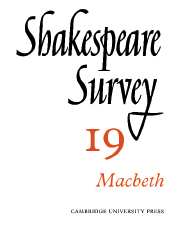Book contents
- Frontmatter
- ‘Macbeth’ in the Twentieth Century
- The Criminal as Tragic Hero: Dramatic Methods
- Antithesis in ‘Macbeth’
- Why was Duncan’s Blood Golden?
- Image and Symbol in ‘Macbeth’
- ‘Macbeth’ and The Furies
- Hell-Castle and its Door-Keeper
- ‘His Fiend-Like Queen’
- The Fiend-Like Queen: A Note on ‘Macbeth’ and Seneca’s ‘Medea
- Shakespeare at Street Level
- New Findings with Regard to the 1624 Protection List
- Shakespeare Productions in the United Kingdom: 1965
- The Royal Shakespeare Company 1965
- The Year's Contributions to Shakespearian Study: 1 Critical Studies
- 2 Shakespeare’s Life, Times and Stage
- 3 Textual Studies
- Index
- Plate Section
3 - Textual Studies
Published online by Cambridge University Press: 28 March 2007
- Frontmatter
- ‘Macbeth’ in the Twentieth Century
- The Criminal as Tragic Hero: Dramatic Methods
- Antithesis in ‘Macbeth’
- Why was Duncan’s Blood Golden?
- Image and Symbol in ‘Macbeth’
- ‘Macbeth’ and The Furies
- Hell-Castle and its Door-Keeper
- ‘His Fiend-Like Queen’
- The Fiend-Like Queen: A Note on ‘Macbeth’ and Seneca’s ‘Medea
- Shakespeare at Street Level
- New Findings with Regard to the 1624 Protection List
- Shakespeare Productions in the United Kingdom: 1965
- The Royal Shakespeare Company 1965
- The Year's Contributions to Shakespearian Study: 1 Critical Studies
- 2 Shakespeare’s Life, Times and Stage
- 3 Textual Studies
- Index
- Plate Section
Summary
In Bibliography and Textual Criticism Fredson Bowers once more advances claims for the role of bibliography in dealing with textual problems. He argues that bibliography gives a higher order of certainty than the traditional methods of textual criticism, because ‘step by step it rests on the impersonal inductive interpretation of physical facts according to rigorous laws of evidence’, while textual criticism rests only on ‘deductive opinion and comparative estimates of values’ (p. 156). For Bowers, ‘the difference between the critical and the bibliographical explanation lies in the laws governing the treatment of the evidence by which the fact is investigated’ (p. 40). Criticism, dealing with words from the viewpoint of meaning, treats ‘the phenomena in a text on internal grounds as self-sufficient evidence’—i.e. ‘deductively’—while bibliography, dealing with words not primarily as vehicles of meaning but in terms of their forms and order as inked shapes on paper, bases its findings inductively on a wider range of evidence, evidence which is ‘external’ as well as ‘internal’ (pp. 36–41). Bowers maintains that ‘when bibliographical and critical judgment clash, the critic must accept the bibliographical findings and somehow come to terms with them’ (p. 29). Bibliography should ‘set up logical safeguards against unprincipled critical speculation and . . . require that critical judgment conforms to certain prerequisite conditions’ (p. 59).
- Type
- Chapter
- Information
- Shakespeare Survey , pp. 154 - 164Publisher: Cambridge University PressPrint publication year: 1967

